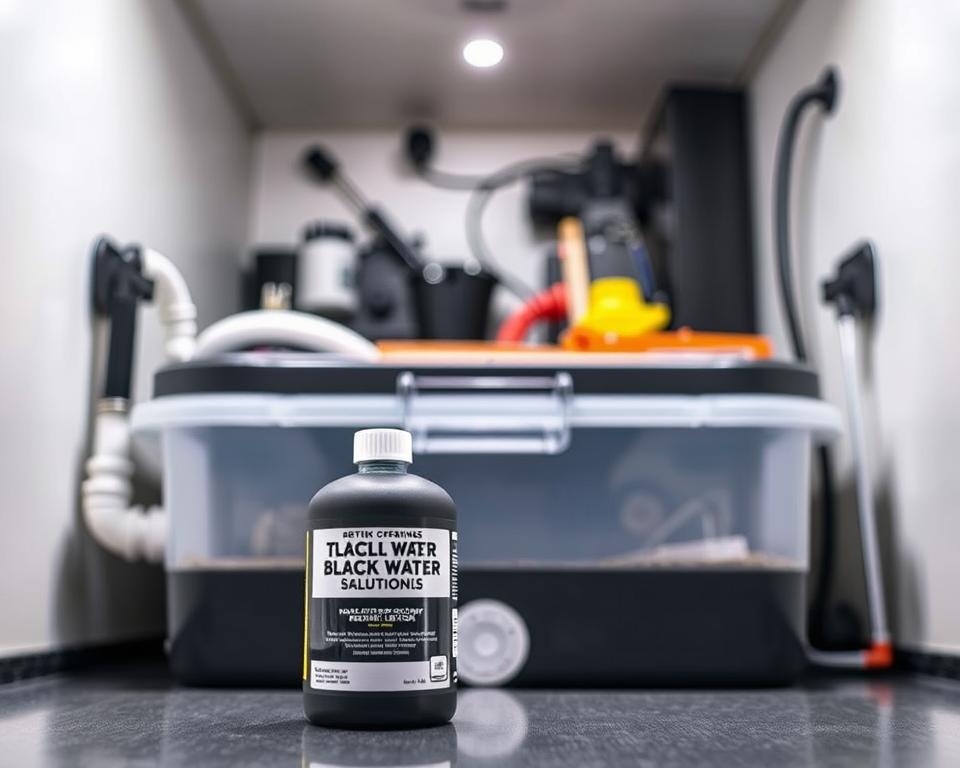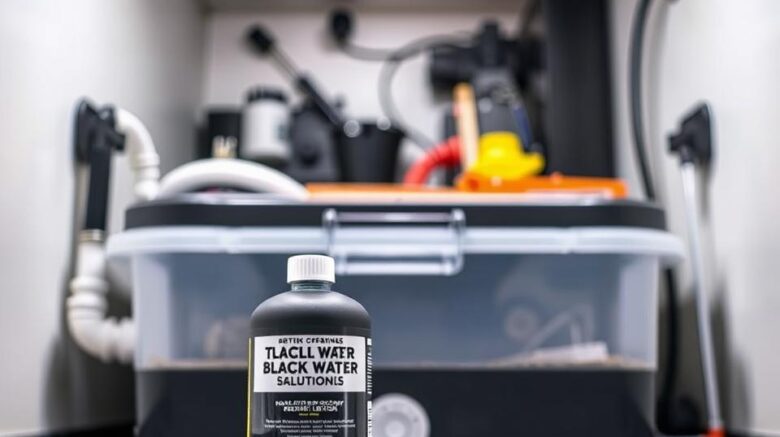RV Black Water Pump: Key Service Tips
Is your RV’s black water pump really road-ready, or might it lead to camping woes? Preserving your motorhome’s waste system in peak form is vital. It prevents unpleasant aromas, back-ups, and expensive damage. Here are crucial advice to guarantee your sewage pump runs smoothly, making your travels serene.
Understanding Your RV’s Plumbing System
The RV plumbing system is essential for any hassle-free adventure. It separates into two main parts: the black water system and the gray water system – RV black water pump. The black water system collects waste from the toilet, and the gray water system processes wastewater from sinks and showers.
The systems employ drain lines that lead to different tanks, designed for optimal waste management. Each tank has a vent to prevent gas from building up, keeping the operation is safe and smells fresh. Proper waste management in an RV is critical to sidestep leaks or bad odors. By understanding both black and gray water tanks, RV owners can maintain and manage waste better.
Knowing how your RV’s plumbing works reveals issues promptly. Consistent maintenance ensures smoother travels for everyone. Keeping on top with your RV’s plumbing system secures reliability during your travels.
Water-Holding Tank Types
Operating RVs involves knowing the different tanks. Each one is key to your RV’s performance, calling for regular upkeep.
The fresh water tank stores potable water. It’s necessary for a pleasant RV experience.
The gray water tank holds sink, shower, and other non-Septic wastewater. Handling this tank keeps your RV fresh while traveling. The black water tank, on the other hand, contains toilet waste. It needs routine emptying and careful maintenance to avoid issues.
By learning about the fresh, gray, and black water tanks, RV owners can smoothly run their systems. This planning and continual maintenance ensure smooth performance of the waste management system.
Functioning of RV Black Water Tanks
The operation of the black water tank is vital in RV waste management. It receives waste from the toilet via a gravity-fed system. Upon flushing, waste and water are channeled to the tank, to be stored until removal is necessary. It’s imperative to keep water levels optimized in the toilet to stop solid waste buildup.
Understanding how RV waste tanks function can prevent clogs and odors. Without proper care, solid waste hardens, producing blockages and emptying difficulties. Thorough tank flushing techniques are key to preventing these issues, ensuring smooth functionality.
Frequent inspection of tank mechanics is advised for RV owners. This includes checking flushing methods and maintaining adequate water flow. Applying these essentials aids in efficient tank maintenance, averting expensive fixes later.

Crucial Maintenance Tips for Your RV Black Water Pump
Performing regular maintenance on your RV’s black water pump is essential. Start by selecting RV-safe toilet paper to reduce clogs and improve flow. A deep flush can remove waste and diminish bad smells. Routinely cleaning the tank helps prevent residue buildup, guaranteeing your RV hygienic and comfortable.
Conduct periodic inspections to check your pump’s condition. Watch for any signs of wear or damage that could hinder its function. Using specialized tank treatments, like those from All in Sanitation, can greatly enhance both performance and cleanliness. Following these tips can increase your pump’s life and enhance your RV’s living conditions.
Opt for RV-Specific Tissue
Maintaining your RV’s black water system demands crucial measures. One essential tip is using RV-safe toilet paper for clog prevention. This dedicated product dissolves quickly in water, ideal for RV sanitation systems.
RV-safe toilet paper is vital for tank maintenance. It dissolves fast, preventing blockages from slow-decomposing materials. This improves waste disposal efficiency and keeps the plumbing clear.
Choose brands designated as RV-safe when buying toilet paper. These products reduce clog risks and boost your black water tank‘s lifespan by sidestepping buildup. Steady use guarantees a stress-free camping experience, void of plumbing troubles.
Proper Tank Cleansing
Deep-flushing your black water tank is essential for responsible waste management in your RV. To aid waste movement, make sure the toilet bowl is sufficiently watered before flushing. Many RVs are equipped with built-in tank flush systems to make the process more streamlined. For RVs without this feature, using tank rinsers that attach to the sewer outlet offers a practical alternative.
Consistent tank flushing assists waste removal and wards off solid accumulations and bad smells. Keeping up with this process delivers your RV stays pleasant, making your travels more agreeable. A dedication to regular and complete tank flushing will upgrade hygiene and the overall condition of your RV’s plumbing system.
Prevent Build-Up with Regular Cleaning
Maintaining your RV’s black water tank clear is key for its best function. Routine cleaning eliminates lingering waste inside the tank walls. This means washing well with water and using specific RV tank cleaners for tough deposits.
By cleaning often, you prevent odors and reduce clog risks. A well-maintained tank makes RVing better and helps your plumbing last longer. Add tank maintenance into your routine to guarantee smooth travels.
Selecting Safe Treatments
Using suitable chemicals for RV black water pump maintenance is vital for managing waste and minimizing smells. Many RV enthusiasts use enzyme-based RV holding tank treatments. These products feature good bacteria to degrade solids and reduce bad odors.
Avoiding harsh chemicals is important to prevent damage to your plumbing. Such substances can erode pipes, leading to high repair bills and diminishing your RV enjoyment. Choosing safe chemicals for odor control secures your tank and pump’s longevity.
Holding your RV black water tank in excellent order enhances your travel experience. Using the right holding tank treatment regularly makes sure your system works well.
Timely Tank Emptying
It’s vital to empty your RV’s black water tank at the appropriate point for effective disposal. Make it a goal to empty when the tank is about two-thirds full is prudent. This avoids solid waste buildup, ensuring a cleaner emptying process.
Dumping at designated stations is imperative for safe, eco-friendly waste handling. It’s vital to keep an eye on the tank‘s levels closely. Letting it max out can create clogs and make disposal more difficult.
Appropriate scheduling and techniques are vital for hygienic waste management and can increase your plumbing’s life. Remaining attentive and maintaining your system correctly delivers a pleasant RV living experience.
Seal Checks & Care
Examining seals around the toilet and tank is critical for leak prevention. Over time, these seals might degrade, leading to odors and potential harm. A comprehensive inspection will show any wear or damage. Catching issues early permits quick replacement to ensure a secure connection and odor-free RV.
Holding a bit of water in the toilet bowl assists in preserving seal condition. This safeguard is key in RV seal upkeep. It prolongs the seals’ life, preventing leaks and foul odors.
Regular seal maintenance can forestall pricey work later. By focusing on seal health, RV owners guarantee a pleasant journey.
Further Advice for Extended Maintenance
Booking professional servicing for your RV at least once a year is wise, particularly for black water tank care. This strategy assists with spotting issues sooner and maintains your plumbing system’s integrity.
When setting your RV for storage, thoroughly clean and empty the black water tank first. Use antifreeze to protect from damage from remaining water during cold seasons. Doing so is essential for maintaining the system, making sure it’s ready for your next adventure.
Steady reviews and preventive actions are key to prolonging your sanitation system’s life. Observing connections, hoses, and seals ensures smooth operations. This mindset boosts your RV experience, making it enjoyable all year round.
Securing your RV’s black water pump is well-maintained is essential for a stress-free camping journey. By observing the maintenance tips shared, you can retain your black water system functioning well. It’s vital to focus on routine washing, applying correct flushing methods, and selecting appropriate chemicals for waste management.
By fulfilling these maintenance requirements, you will prevent unpleasant odors and blockages. This also increases your RV plumbing system’s durability. Proactive care of the RV black water pump yields more time enjoying the outdoors, without concern for potential setbacks.
Don’t forget, proper upkeep is key next time you gear up for an outing. It’s not the highlight of RV ownership, yet it significantly boosts your travel experience.
